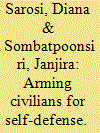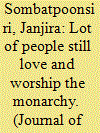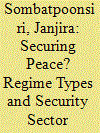| Srl | Item |
| 1 |
ID:
107937


|
|
|
|
|
| Publication |
2011.
|
| Summary/Abstract |
This paper examines the supply and demand sides of firearms proliferation and highlights the negative impacts they have on the security of the civilian population and communal relations in the conflict-affected region of Southern Thailand. Based on information gathered during focus group discussions and in-depth interviews, the article argues that firearms proliferation and the creation of civilian militias in Southern Thailand have spawned a flourishing gun economy that is exacerbating religious and ethnic polarization and communal violence. As a result, social ties are breaking down and ethno-religious discrimination is intensifying. Without a reduction in the militarization of civilians, the conflict in Southern Thailand is likely to become deeply entrenched as has happened in other violent conflicts. The paper is organized in three sections. The first section examines firearms supply in Southern Thailand. The second investigates the way in which the supply corresponds with the general demand for firearms. Finally, an analysis of the impacts of firearms proliferation and the arming of civilians is presented.
|
|
|
|
|
|
|
|
|
|
|
|
|
|
|
|
| 2 |
ID:
190022


|
|
|
|
|
| Summary/Abstract |
This article examines the interplay between nonviolent movements’ use of polarizing issues for mobilization and pro-regime countermobilization. Thailand has been chosen as an explanatory case study because it has a history of political polarization and pro-regime mass mobilization. I focus on polarizing frames that were incorporated into the 2020 nonviolent resistance campaigns, which addressed a taboo subject in the country: the monarchy. In response, the regime applied various forms of repression, including the mobilization of royalists. But the assumption that the regime single-handedly mobilized countermovements is only half of the story. Autonomous elements within countermovements also joined forces when there were sufficient social conditions. By juxtaposing protest event data with an analysis of mobilizing frames (through movements’ Twitter hashtags), I shed light on a two-pronged process that underpins the nexus between framing choice and countermobilization: (a) how a movement’s choice for polarizing frames sustains existing ideological and identity-based cleavages, antagonizing segments of society that perceive their collective identity to be under siege and; (b) how these ideological and identity-based cleavages also provide social sources for countermobilization. I conclude by addressing some implications of this framing choice–countermobilization nexus on repression dynamics and suggest how we can rethink the relationship between strategic framing and nonviolent resistance campaigns in divided societies.
|
|
|
|
|
|
|
|
|
|
|
|
|
|
|
|
| 3 |
ID:
160663


|
|
|
|
|
| Summary/Abstract |
This article examines how regime types shape security sector reforms, that are integral to the peace processes in Thailand’s Patani and the Philippines’ Mindanao. Lessons drawn from Thailand and the Philippines, illuminate the interplay between regime types and peace processes and reveal that: (1) democratic regimes tend to address aspects of security sector reform; (2) military regimes may cherry-pick a security agenda for tactical reasons, while turning peace talks into ‘ceremonial structures’; (3) weak democratic institutions are not necessarily amenable to security sector reform, but democratic spaces can empower civil society to propel security actors to embrace some degree of reform.
|
|
|
|
|
|
|
|
|
|
|
|
|
|
|
|